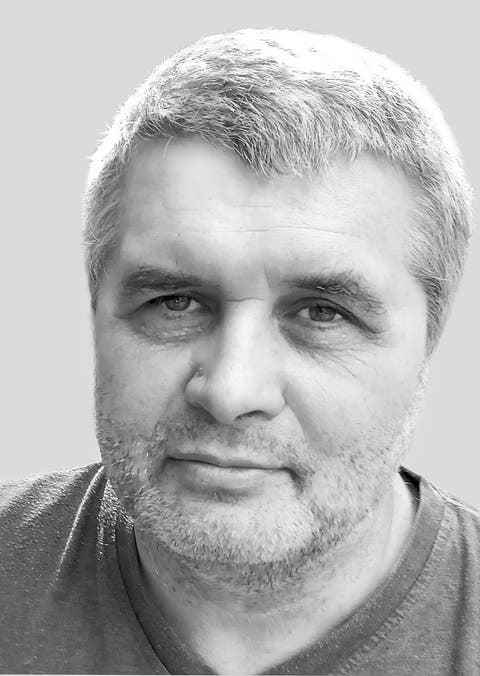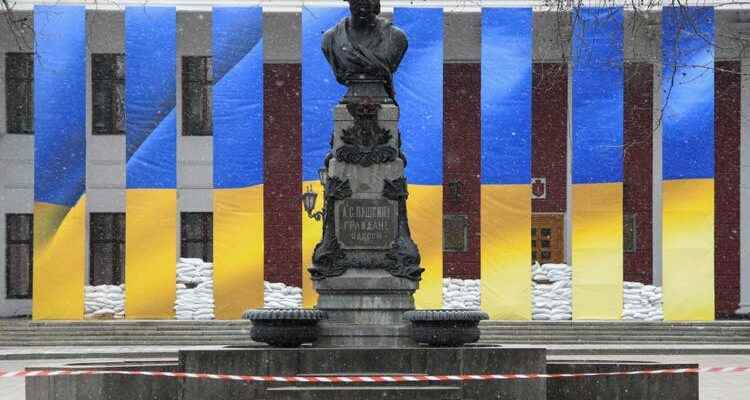Sergei Gerasimov is holding out in Kharkiv. In his war diary, the Ukrainian writer reports on the horrific and absurd everyday life in a city that is still being shelled.
The Russian poet Alexander Pushkin, patriotically fenced in Odessa.
October 18, 2022
When I enter the metro station, the first thing I see are two soldiers with submachine guns, who examine everyone’s faces. I walk past them feeling like I’ve done something wrong, but I’m not the one they’re looking for.
I don’t wear a face mask. Although a poster on the wall indicates that passengers without masks or respirators are not allowed to enter the subway station, nobody seems to care. Some people sneeze or cough. I keep my distance
I haven’t been here for four or five months, and the station is almost a stranger to me now. As if seeing it for the first time, I look at the billboards that have been hanging here since the pre-war period. They show a young idiot betting on sports and undoubtedly winning; a wacky girl who takes the world’s most perfect selfie; and an even crazier granny who rejuvenated herself because she was taking the wrong medication. Now these images are oddly annoying. How could we ever care about such insignificant things?
A beggar with a disgusting leg that is almost rotten to the bone asks for money. People pretend not to see him as he drags his leg behind him, but when he walks by they see it in all its glory. Then they get up from their benches, go over to him and throw some money into the plastic cup he’s holding. He says something and answers the question why he is not seeking medical help. When I hear his words and see his smile, I realize that he has mental health issues.
A sign on the toilet door says “Open,” but the back says “Sorry, no water.”
I notice that the station’s name, Moscow Street, has disappeared. It’s different now because the word Moscow has become taboo.
Centuries ago, before it became a real street, Moscow Avenue was called Moscow Street. Of course, it led from Kharkiv to Moscow. After that it became the Moscow Street and the Old Moscow Street until it was renamed Stalinallee. It later existed as Moscow Avenue for decades and still led to Moscow. Now, for obvious reasons, people no longer need to go to Moscow, and the longest street in Kharkiv, 18 kilometers long, has been renamed again. It is now called Street of Kharkiv Heroes.
Pushkinskaya station, named in honor of Alexander Pushkin, has not yet been renamed. Pushkin was the poet who wrote two hundred years ago: “Long will I be honored by men because I have kindled their noblest thoughts and glorified freedom in my cruel age.” But still, Pushkin is an enemy because he is Russian, and there are no good Russians, and good Russians are too, because they are Russians. . . I think the station will be renamed sooner or later. A Pushkin monument in Kharkiv has already been spattered with red paint resembling blood.
I’m finding that people aren’t as glued to their smartphone screens as they used to be. Half of them stare blankly into space or at their hands. Some of them even read thick books.
In one of the main train stations I see an exhibition of children’s drawings – something that was impossible in the pre-war commercial era, when every square inch of the wall seemed to be worth many dollars. The drawings are mostly realistic, but I can occasionally see hints of Cubism or Suprematism. Most of them are pretty average.
But there is something else, real: images of pale-faced children living in the Kharkiv metro, hiding from Russian bombs; they were drawn with the help of art teachers. They’re not really children’s drawings, but people stop in front of them and can’t tear themselves away for a while. You stare at the pictures and read the captions:
“That’s me, in an air raid shelter.”
“My superheroes aren’t Marvel characters, they’re the Ukrainian army.”
As I step out of the subway station, I wait for the soldiers to look at my face again, but the only soldier at the exit is talking on a mobile phone. He is well over forty and has had stubble on his face for two weeks. He smiles brightly and genuinely, showing a large mouth with a few broken teeth.
To person

Sergei Gerasimov – What is the war?
Of the war diaries written after the February 24 Russian invasion of Ukraine, those of Sergei Vladimirovich Gerasimov are among the most disturbing and touching. They combine the power of observation and knowledge of human nature, empathy and imagination, a sense of the absurd and inquiring intelligence. Gerasimov was born in Kharkiv in 1964. He studied psychology and later wrote a psychology textbook for schools and scientific articles on cognitive activity. His literary ambitions have so far been science fiction and poetry. Gerasimov and his wife live in the center of Kharkiv in an apartment on the third floor of a high-rise building. The NZZ published 71 “Notes from the War” in the spring and 69 in the summer. The first part is now available as a book on DTV under the title «Feuerpanorama». Of course, the author does not run out of material. – Here is the 30th contribution of the third part.
Translated from the English by Andreas Breitenstein.
